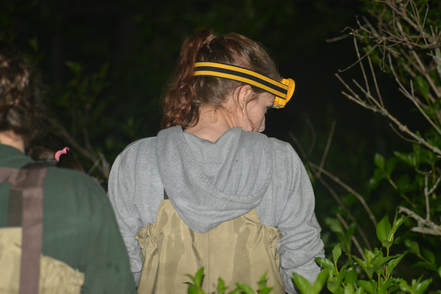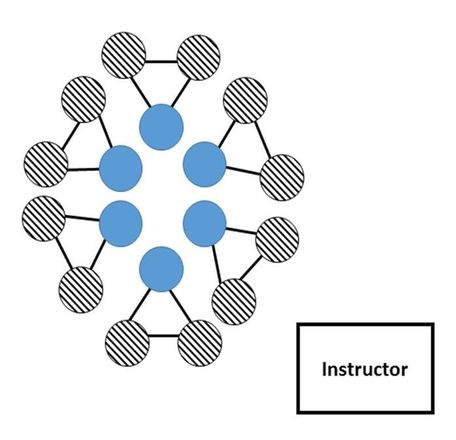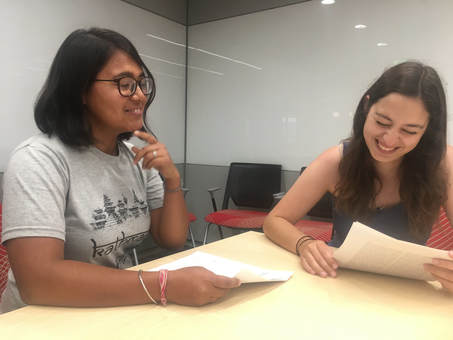Teaching Philosophy
Of all the classes I took as an undergrad and grad student, herpetology and ichthyology were by far my favorites. Although I had already been catching fish, frogs, turtles, and snakes since I was a little kid, I credit the structure of these classes with igniting my latent interests.
Unlike previous classes, they utilized student-centered models of learning. We developed our own research projects, taught each other how to identify museum specimens, and spent at least one day every week in the field using new sampling techniques to catch and identify specimens that would appear on our lab practicals.
I integrate the student-centered model of learning into my own courses to facilitate the ability of students to reason, ask, and answer their own questions. Student-centered learning is effective in a variety of settings and engenders a feeling of ownership of the learning process in the student. But, perhaps most importantly, it also promotes the development of students into self-directed problem-solvers with critical thinking skills.
I have used various approaches to engender student ownership of the learning process in large lecture classes, medium discussion classes, and small field courses (see examples below). And, being that I see my teaching as a continually evolving process, I use informal assessments throughout the class to gage my teaching effectiveness and detect potential misconceptions.
Unlike previous classes, they utilized student-centered models of learning. We developed our own research projects, taught each other how to identify museum specimens, and spent at least one day every week in the field using new sampling techniques to catch and identify specimens that would appear on our lab practicals.
I integrate the student-centered model of learning into my own courses to facilitate the ability of students to reason, ask, and answer their own questions. Student-centered learning is effective in a variety of settings and engenders a feeling of ownership of the learning process in the student. But, perhaps most importantly, it also promotes the development of students into self-directed problem-solvers with critical thinking skills.
I have used various approaches to engender student ownership of the learning process in large lecture classes, medium discussion classes, and small field courses (see examples below). And, being that I see my teaching as a continually evolving process, I use informal assessments throughout the class to gage my teaching effectiveness and detect potential misconceptions.
Classes Taught at Wichita State University (2019 - Present)
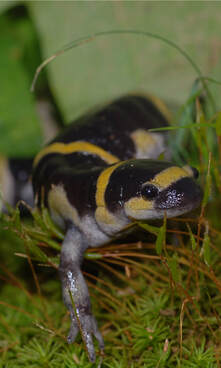
Fall 2019
Biology Colloquium (BIOL 497/797) - Organized Weekly Departmental Seminar of Guest Speakers
Spring 2020
Vertebrate Zoology (BIOL 524) - Tues/Thurs lecture on the evolution, ecology, and just plain awesomeness of vertebrates.
Fall 2020, 2021
Experimental Design (BIOL 740I) - Tues/Thurs rotating discussion format. Delving into the philosophy of designing good experiments and making appropriate inferences from data.
Spring 2021
Herpetology (with lab) (BIOL 640CA & 640CL) - Tues/Thurs lecture and lab on amphibian and reptile evolutionary history, physiology, taxonomy and ecology. Labs cover the ID and ecology of all native amphibians and reptiles.
Summer 2021
Field Vertebrate Zoology (BIOL 640CB) - Tues/Thurs full day field experiences learning field techniques for working with aquatic, terrestrial and aerial vertebrates. Students design and carry out an independent group research project and each student collects 100 vertebrate signs (photographs & audio).
Upcoming
Spring 2022: Vertebrate Zoology (with Lab!) - All things vertebrate with a lot o' lab
Summer 2022: Field Vertebrate Ecology - Like Summer 2021, but in Southern Arizona!!!!!
Fall 2022: Vertebrate Zoology (with Lab!) - All things vertebrate with a lot o' lab
Spring 2023: Herpetology - All things awesome once again.
Biology Colloquium (BIOL 497/797) - Organized Weekly Departmental Seminar of Guest Speakers
Spring 2020
Vertebrate Zoology (BIOL 524) - Tues/Thurs lecture on the evolution, ecology, and just plain awesomeness of vertebrates.
Fall 2020, 2021
Experimental Design (BIOL 740I) - Tues/Thurs rotating discussion format. Delving into the philosophy of designing good experiments and making appropriate inferences from data.
Spring 2021
Herpetology (with lab) (BIOL 640CA & 640CL) - Tues/Thurs lecture and lab on amphibian and reptile evolutionary history, physiology, taxonomy and ecology. Labs cover the ID and ecology of all native amphibians and reptiles.
Summer 2021
Field Vertebrate Zoology (BIOL 640CB) - Tues/Thurs full day field experiences learning field techniques for working with aquatic, terrestrial and aerial vertebrates. Students design and carry out an independent group research project and each student collects 100 vertebrate signs (photographs & audio).
Upcoming
Spring 2022: Vertebrate Zoology (with Lab!) - All things vertebrate with a lot o' lab
Summer 2022: Field Vertebrate Ecology - Like Summer 2021, but in Southern Arizona!!!!!
Fall 2022: Vertebrate Zoology (with Lab!) - All things vertebrate with a lot o' lab
Spring 2023: Herpetology - All things awesome once again.
Prior Classes Taught
Statistics for Ecologists (Campus Lecture with Lab) - Michigan State University
- Introductory course into probability and applied ecological statistics for science majors (~100 student enrollment) PDF Syllabus
- Utilize a “mini-lecture” approach for traditional lecture settings (50-minute lecture broken into short lectures interspersed with think-pair-share activities and quick live assessments (e.g., poll everywhere). PPT Lecture Example
- Students report feeling more involved in the class with this approach, and the interspersion of assessments among short lectures allows me to catch misconceptions in the incipient phase of formation.
- Excerpts from evaluations (PDF of full evaluations):
... Tom makes the class fun and enjoyable, especially when dealing w/stats... A not so fun subject.
... he explains things in a way that is easy to understand.
... it's a great class and the teacher makes it easy to understand the coursework.
... Dr. Luhring is very enthusiastic and seems to care if students learn the material. He is a great professor.
... he is able to keep you interested in the subject and explain it really simply so everyone can understand.
Statistics for Ecologists (Field Course!) - Kellogg Biological Station, MSU
Field courses also provide ample opportunities to do fun stuff like exploring frog choruses, estimating the average age of tombstones in a cemetary or sampling leeches in a local pond.
|
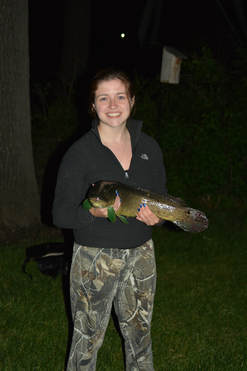
Excerpt from end of class reflection paper (used with permission):
When I heard that I had to take a statistics class in order to complete my major in Fisheries and Wildlife, I just about keeled over... Every horror story that I had ever heard about statistics raced to my mind and I thought, this class will be the end of my GPA. ... when I heard that I could take an applied stats course here over the summer, I thought it would be a little less trying since we would be able to go outside and at least enjoy the sunshine while little pieces of my soul were being taken away from me... The anticipation of this class for me was obviously not a very good one... Boy am I glad I took it here at KBS with you... Statistic's material is not an easy thing to understand... The difference for me... was in how the material was presented and the interaction that you gave to us... ...[T]he instruction was clear and the instructor actually took the time to make sure that each of us understood the material... ... and was always open for questions, in and outside of the classroom... ...[T]he symbols and equations are no longer squiggles on the board any longer. Thank you for such an amazing class! - Logan Brissette (Summer 2015) |
Introduction to Science, Technology, Environment, and Public Policy - MSU
|
... It was fantastic experiencing the debate on topics such as the relationship between science and politics with our professors, classmates, and with an array of guest professors who work in the field. The discussions were truly engaging and I learned a lot! |
Climate Change and Ectotherms - University of Nebraska
... I found this to be an amazing learning opportunity. This was the first class I took in a discussion-based format and I believe it was quite helpful in developing my understanding of climate change and ectotherms. |
Anisha and Miranda reenact a typical discussion from the class
|
